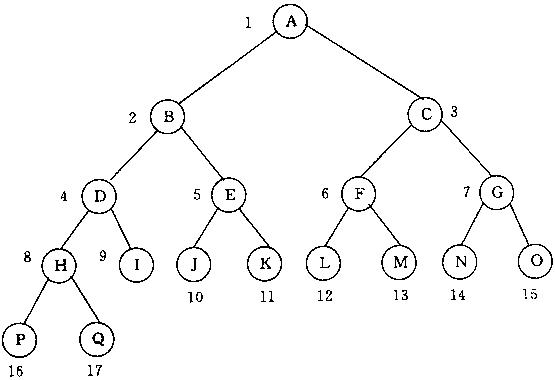
| Online Judge | Online Exercise | Online Teaching | Online Contests | Exercise Author |
|
F.A.Q Hand In Hand Online Acmers |
Best Coder beta VIP | STD Contests DIY | Web-DIY beta |
Minimum Heap
Time Limit: 2000/1000 MS (Java/Others) Memory Limit: 32768/32768 K (Java/Others)Total Submission(s): 322 Accepted Submission(s): 149
Problem Description
Alex is curious about data structures. He is working on binary trees recently and particularly interested in complete binary trees.

A complete binary tree satisfies that all levels of the tree, except possibly the last one (deepest) are fully filled, and, if the last level of the tree is not complete, the nodes of that level are filled from left to right.
Alex defines his own complete binary tree: each node has a weight, while father's is always less than or equal to its sons'. He names this complete binary tree as minimum heap.
Now he wants to know: With N nodes weighted from 1 to N (each appears once), how many heaps can be created. The answer (represented by Q) may be very large, so please output a number P while P = Q mod M.

A complete binary tree satisfies that all levels of the tree, except possibly the last one (deepest) are fully filled, and, if the last level of the tree is not complete, the nodes of that level are filled from left to right.
Alex defines his own complete binary tree: each node has a weight, while father's is always less than or equal to its sons'. He names this complete binary tree as minimum heap.
Now he wants to know: With N nodes weighted from 1 to N (each appears once), how many heaps can be created. The answer (represented by Q) may be very large, so please output a number P while P = Q mod M.
Input
The input consists of several test cases. The first line contains a number T, indicating the number of test cases. Each test case is on a single line, and it consists the number N and M.
Technical Specification
1. 1 ≤ T ≤ 10
2. 1 ≤ N ≤ 1000
3. 2 ≤ M ≤ 1000,000,000
Technical Specification
1. 1 ≤ T ≤ 10
2. 1 ≤ N ≤ 1000
3. 2 ≤ M ≤ 1000,000,000
Output
For each test case, output the number P on a single line.
Sample Input
2 1 9973 100 9973
Sample Output
1 174
Source
| Home | Top |
Hangzhou Dianzi University Online Judge 3.0 Copyright © 2005-2025 HDU ACM Team. All Rights Reserved. Designer & Developer : Wang Rongtao LinLe GaoJie GanLu Total 0.000000(s) query 1, Server time : 2025-04-02 00:26:03, Gzip enabled |
Administration |